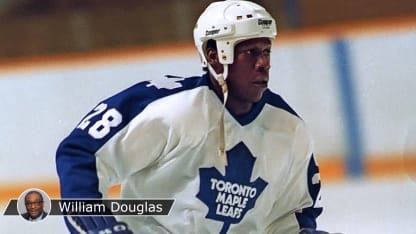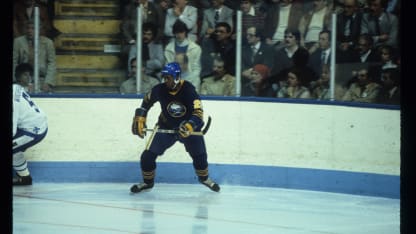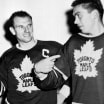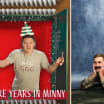William Douglas has been writing The Color of Hockey blog for the past seven years. Douglas joined NHL.com in March and will be writing about people of color in the game. Today, he profiles Val James, who became the NHL's first black player born in the U.S. on Nov. 1, 1981.
Color of Hockey: James paved way for U.S.-born black players in NHL
Overcame racial abuse from opposing fans after making debut with Sabres in November 1981

Val James
said he raised a beer and recited a prayer Friday, quiet gestures he does yearly to celebrate his place in hockey history.
The toast commemorates the anniversary of his
NHL debut with the Buffalo Sabres on Nov. 1, 1981
, which made him the
first U.S.-born black player in the NHL
, a fact that's rarely recognized beyond Black History Month.
The prayer is for James' father, Henry, who passed away months before his son jumped onto the ice for his first NHL shift in the third period of the game between the Sabres and Philadelphia Flyers at Buffalo's Memorial Auditorium.
"I just kind of enjoy the day, think about what happened and how everything went down for me getting up to that point," James said. "I lost my father that year too, in the summer. You think about all that; it all comes flooding back and what people sacrificed for me to get to where I got. Those are the types of things that go through your head on that day."
James' appearance in that game, a 6-2 win by the Sabres, didn't make headlines. The big stories were the two goals scored by Buffalo left wing
Tony McKegney
, another black player, Flyers rookie goalie
Pelle Lindbergh
playing in his first NHL game and a gruesome right ankle injury to Philadelphia defenseman
Bob Dailey
that effectively ended his career.
"I don't think anyone actually thought about it," James said of the historical significance of him being in the lineup. "I never thought about it at the time either. I thought about it later, which was a great achievement for me in my own mind, but I think it kind of slipped under the radar."
James had a brief NHL career. He played 11 games, seven in 1981-82 with Buffalo and four with the Toronto Maple Leafs in 1986-87, and did not have a point.
He spent more than a decade playing for teams in the American Hockey League, Eastern Hockey League, Northeastern Hockey League and International Hockey League before a shoulder injury forced him to retire. The highlight of his pro career came in 1983, when he scored the goal that gave Rochester of the AHL the Calder Cup championship.
"I could see him improving in aspects of his game. I wasn't hesitant to put him up at forward, he played left wing on a consistent basis," said longtime NHL coach Mike Keenan, who coached him at Rochester. "The championship team that we had, he fit in well. He improved, he worked at his game. As far as an individual, he was completely tied into the team concept, he had great investment in the team."
Hockey didn't come easy for James, an Ocala, Florida, native who didn't lace on a pair of skates until he was a 13-year-old rink rat at the old Long Island Arena in Commack, New York, where his father worked as operations manager.
He left home at 16 and played two seasons with Quebec of the Quebec Major Junior Hockey League. The Detroit Red Wings selected him in the 16th round (No. 184) of the 1977 NHL Draft but never signed him.
The Sabres signed James after he played three seasons with Erie in the EHL and NEHL.

James developed into the type of player who protected more skilled teammates and made everyone a little tougher.
But the toughest opponents he faced weren't always on the ice; they were in the stands, hurling racist epithets and insults his way. Being a trailblazer, even an unsung one, had its price.
He broke his suffering down mathematically, saying he heard racial slurs about every three seconds at 40 road games per season during a 10-year period.
"I guess being a first you do take a little more flack because people aren't used to it. That's the only way to explain it," James said. "Somehow, they get the feeling that's something's being taken away from them - how that creeps into someone's mind, I don't know, but it does."
At least 15 U.S.-born black players have played in the NHL since James' debut, a list that includes Columbus Blue Jackets defenseman Seth Jones and Minnesota Wild forward Jordan Greenway, as well as retired forward
Mike Grier
, an assistant with the New Jersey Devils who played in 1,060 NHL games.
There are more in the pipeline. Three black U.S.-born players -- goalie
Isaiah Saville
and defensemen
Marshall Warren
and
Jayden Struble
-- were among the players of color selected in the 2019 NHL Draft.
"I feel I have opened a few doors for guys that might not have gotten that chance later on in their careers," James wrote in "Black Ice: The Val James Story," his 2015 autobiography. "So to be able to do something like that for someone, whether it be my race or someone else's race, it's just a nice thing to do."
Keenan, who guided the New York Rangers to the Stanley Cup in 1994 and coached the Flyers (1985, 1987) and Chicago Blackhawks (1992) to the Cup Final, marveled at James' perseverance through the vitriol.
"Of course it was difficult. Any transition that you make where there are cultural boundaries is difficult," he said. "I saw him engage with a number of individuals because of disparaging comments they made about him and his skin color. But he had our support. Our team was very supportive of Val and respected him."
But the years of constant racial abuse left James emotionally scarred. He went off the grid after he retired in 1988 because of the shoulder injury. He couldn't bring himself to watch hockey for more than a decade.
James said writing "Black Ice" with co-author John Gallagher has helped him re-engage with the hockey community, former teams and teammates, as well as helping him put the cruel treatment he endured into perspective.
"It was one of those things you think about all the stuff you went through and then, really, no recognition whatsoever about it all so that you could actually talk about it," James said. "I guess writing the book was like a therapeutic aid to me. It kind of brought out all that stuff and I could actually go through it and purge my mind of it and realize that, you know what, it's not someone just hating you, it's just hating an idea is what it is."

















